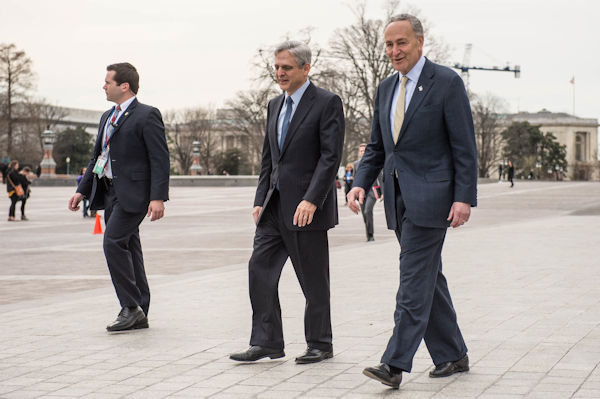SEJournal Online is the digital news magazine of the Society of Environmental Journalists. Learn more about SEJournal Online, including submission, subscription and advertising information.
 |
 |
| A coalition of open-government groups has appealed to Attorney General Merrick Garland (above, center, in 2016 with Sen. Chuck Schumer, at right) to declare a federal policy favoring openness. Photo: Senate Democrats, Flickr Creative Commons. Click to enlarge. |
WatchDog Opinion: A Report Card on Transparency in the Biden Administration
By Joseph A. Davis
As if Joe Biden didn’t have enough challenges already, it’s time to ask how he’s doing on transparency. Clearly, freedom of information groups want more.
Emblematic of that tension is a Jan. 31 letter from 26 open-government groups to Attorney General Merrick Garland, asking him to declare a federal policy favoring openness.
That’s an easy request, not even a heavy lift.
The Justice Department oversees federal agencies’ compliance with the Freedom of Information Act via DOJ’s Office of Information Policy. Several recent administrations — both Republican and Democratic — began their tenure with a FOIA policy statement.
Under George W. Bush, the legendary “Ashcroft memo” urged agencies to give requesters as little information as possible. Under Obama, Attorney General Eric Holder told agencies to prefer disclosure.
Such memos are symbolic, but they
also have real effect. FOIA is a law.
Agencies are required to comply with it.
Such memos are symbolic, but they also have real effect. FOIA is a law. Agencies are required to comply with it. Since the FOIA law was passed in 1966, courts have spent decades interpreting it and Congress has spent decades amending it. Many of FOIA’s most important requirements are not optional.
At the same time, agencies still have a lot of discretion over how they administer FOIA — for example, how they interpret its many exemptions and deadlines. That’s why the policy articulated by the Justice Department matters.
The Trump administration hardly won plaudits for its openness, via FOIA or any other mechanism. In fact, the WatchDog spent much of Trump’s four years complaining about the subversion of FOIA and open government at the U.S. Environmental Protection Agency and the Interior Department.
Signal a change from Trump
That’s another reason why a definitive declaration from DOJ would matter a lot — to signal a change from Trump-era policies.
And let’s face facts: Attorney General Garland has been a bit slow in disowning all the bad choices made by the Trump DOJ.
The open-government community has been tapping its fingers. Members of the same coalition wrote a similar letter to Garland way back in April 2021. They got no response.
The groups involved in the coalition — led by Open The Government — are mostly civil society groups like the ACLU and the Electronic Frontier Foundation. But they included journalism groups like the Society of Professional Journalists as well.
The coalition’s ask does have some mooring in political reality. Its call to DOJ was amplified by another letter on Feb. 23 from a bipartisan coalition of Congress members.
That was a reminder that, for years, a stream of small legislative improvements to FOIA had been shepherded through Congress by champions like Sens. John Cornyn (R-Texas) and Patrick Leahy (D-Vt.). And a reminder, too, that bipartisan consensus is one of the more effective ways to get things through the 50-50 Senate.
DOJ guidance matters now
One problem with news media is that they are living in the now. What journalist alive today (we ask, facetiously) remembers 2016, when Congress last passed a set of FOIA amendments? That law finally codified the “presumption of openness” that over the years had been a bone of contention in successive DOJ declarations.
A DOJ guidance declaration now would reaffirm the department’s insistence that agencies follow the law through the welter of hurdles and exemptions.
A DOJ declaration now could also break some new ground that needs breaking.
The WatchDog has never been shy with suggestions on how things could be improved. For example, DOJ could stop trying to prosecute journalists under the Espionage Act or explicitly reaffirm the guidelines adopted under former Attorney General Holder that discourage subpoenas of journalists for their sources.
De-Trumpification of openness
and FOIA is a big job
— if done right.
De-Trumpification of openness and FOIA is a big job — if done right. During the Trump years, backlogs of unfilled FOIA requests grew and were used as an excuse for agency unresponsiveness.
Good thing the law requires agencies to file an annual report that includes stats on backlogs and backlog reduction. Those reports for fiscal 2021 were due in to DOJ for clearance back on Nov. 15, 2021.
The agencies were supposed to post them online by March 1, 2022. We are happy to report that most agencies have done so (see the data).
Joseph A. Davis is a freelance writer/editor in Washington, D.C. who has been writing about the environment since 1976. He writes SEJournal Online's TipSheet, Reporter's Toolbox and Issue Backgrounder, and curates SEJ's weekday news headlines service EJToday and @EJTodayNews. Davis also directs SEJ's Freedom of Information Project and writes the WatchDog opinion column.
* From the weekly news magazine SEJournal Online, Vol. 7, No. 10. Content from each new issue of SEJournal Online is available to the public via the SEJournal Online main page. Subscribe to the e-newsletter here. And see past issues of the SEJournal archived here.












 Advertisement
Advertisement 



